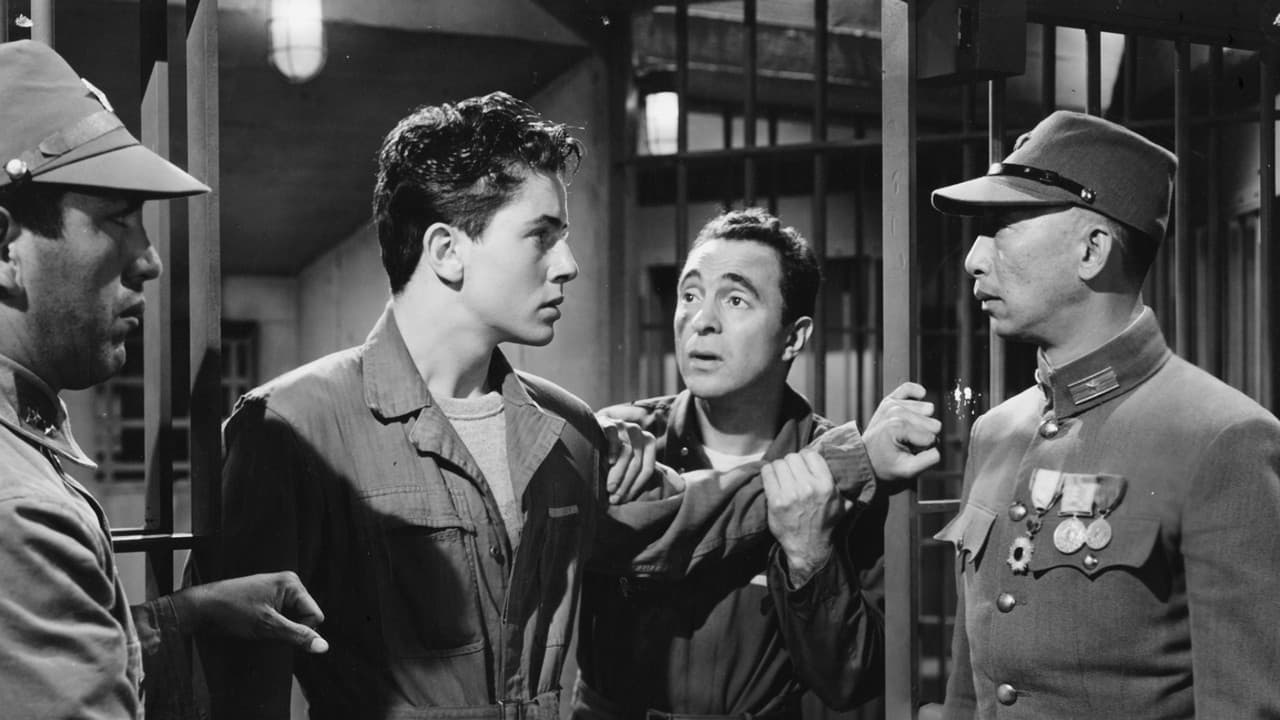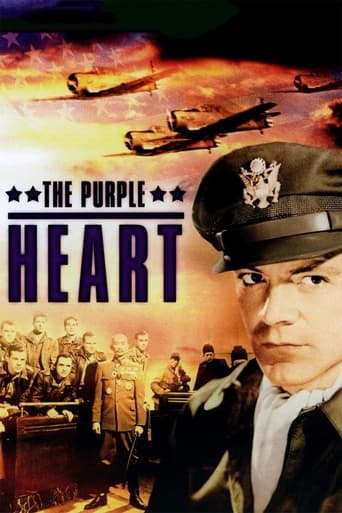



A bit overrated, but still an amazing film
When a movie has you begging for it to end not even half way through it's pure crap. We've all seen this movie and this characters millions of times, nothing new in it. Don't waste your time.
View Moreit is the rare 'crazy' movie that actually has something to say.
View MoreYour blood may run cold, but you now find yourself pinioned to the story.
View MoreTo borrow a couple of adjectives from its own theatrical trailer, this is one of the most "original" and "gripping" movies about WWII, made by Hollywood's 'Chronicler Of War' par excellence Milestone. It deals with a group of eight American airmen who bail out over China after having bombed Japan; betrayed to the enemy, they find themselves on trial for murder to which reporters with Communist sympathies from various countries are "invited" to perform jury duty! since the Japs claim that their targets had been hospitals (which they're ready to corroborate by means of newsreel footage depicting the carnage, even if jury members readily admit amongst themselves to be fake!) rather than munitions factories as the Yanks assert. However, despite the physical and mental torture to which the latter are subjected, all doesn't go smoothly for their accusers: first an opportunistic Chinese Governor, who's a prime witness, is assassinated (by his own upstanding son) in the courtroom and, then, when the Japanese Navy and Military (represented by the wily yet over-confident Richard Loo) themselves lock horns over the means of transportation used by the Americans (which would imply that one or the other was slack in its defense duties!). Being a wartime production, the tone is heavily jingoistic: peppered with homespun recollections of the prisoners' lives back home and displays of camaraderie every time one of them returns from his 'cross-examination', to say nothing of defiance in the face of their impending execution. Milestone's handling never strikes a false note throughout and has selected a sturdy cast besides: led by decent captain Dana Andrews (though the actor preferred to conceal his own operatic background for fear of being typecast, we do get to hear him sing here albeit in unison with his fellow soldiers), Italo-American Richard Conte, youngster Farley Granger and tough-but-compassionate Sam Levene. That said, the film is equally notable for its moody lighting (by top Fox cinematographer Arthur Miller) and inspired art direction (with proceedings mostly confined to the courtroom, prison cell and interrogation room).
View MoreFilmed in 1944 this movie has all the hallmarks of a jingoistic propaganda movie for the home front that was getting weary of the war. The racism and stereotyping is hardly subtle. A crew of a downed plane from the Doolitlle raid (the first attack on Japanese soil by the Yanks, all done to show the Japanese they were vulnerable) is put on trial for war crimes. They are tortured to reveal from where their raid originated. The Japanese Army wanted to humiliate the navy for allowing the raid (which came off American air craft carriers) and the men are pawns in the in fighting.The airmen are individually tortured off screen, and returned to their cells, all showing damage from the ordeal. Who will break? As this is a propaganda vehicle I'll leave you to guess if any of them do. In the end Dana Andrews gets to make a "we're coming to get you, you bastards" speech on the witness stand and the men are marched off to their doom.The acting is fine if overwrought. The script is clogged with "home sweet home" memories. Poems are recited, and battle hymns sung, and it's all too cloyingly ludicrous in 2007, or post 1970 for that matter. But I'm sure it left no dry eye in the audience, and it must have swelled the recruiting stations.Interesting is the fact that the crew is accused of bombing civilian targets. As if! No red blooded American would do that! Well we did. Not in this raid, but later in 1944-45. In addition to the 2 nukes we dropped we systematically, deliberately bombed major cities, causing fire storms and killing off 3/4 of a million Japanese civilians. As McNamara famously quotes General Le May, in "The fog of war": "if we lose we'll be tried as war criminals." We won, and the Americans marched on to the moral high ground!
View MoreFrom the beginning I was impressed with Lewis Milestone's direction. The film opens in a darkened courtroom (although the emblem of the rising sun can be discerned on the far wall). A man in uniform enters and switches on the lights. Another man enters with a pitcher of water and begins preparing for the ritual of the judges' entrance. The first man begins opening the window blinds. This leisurely accumulation of detail gives these moments a documentary feel that lends verisimilitude to the events that follow. Even when the American heroes respond to their captors with caustic patriotic speeches, there's still an aura of realism that makes it hard to classify this movie along with the cruder propaganda efforts of the times.
View MoreThis film is so good, it makes you want to drop another bomb on them! After reading the book FOUR CAME HOME, which tells the story of one of the two B-25 crews that had to crash-land in China after the Doolittle raid on Tokyo (Cook 'Em!), I was very impressed by this film and how 95% of it stuck true to the story. So I did some research and also learned that the Argentinian and Russian reporter's roles, other than the name changes, were very factual in that both were eventually appalled at the Japs utter disregard for the Geneva Rules and Legal Rules in general and how the men were treated, and a good deal of the information in FOUR CAME HOME was supplied to the author from these two reporters. Yeah, the Japanese were a WONDERFUL race of people, weren't they? Watch this film, knowing its true nature, and you won't think so anymore.
View More